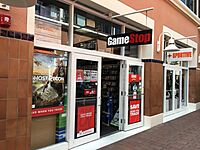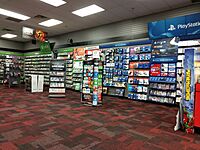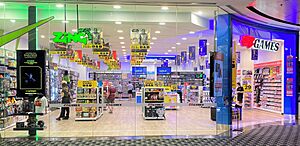GameStop facts for kids
Logo since 1999
|
|
|
Formerly
|
Babbage's (1984–1999) |
|---|---|
| Public | |
| Traded as |
|
| Industry | Retail |
| Predecessors |
|
| Founded | 1984 |
| Founders |
|
| Headquarters |
,
U.S.
|
|
Number of locations
|
4,413 (Jan 2023) |
|
Area served
|
Several countries
Australia
Austria Canada France Germany Italy New Zealand Switzerland United States |
|
Key people
|
Ryan Cohen (Chairman and CEO) |
| Products |
|
| Revenue | |
|
Operating income
|
|
| Total assets | |
| Total equity | |
|
Number of employees
|
11,000 full-time 14,000–27,000 part-time (Jan 2023) |
| Parent | NeoStar Retail Group (1994–1996) Babbage's Etc. (1996–1999) Barnes & Noble (1999–2004) |
| Subsidiaries |
|
GameStop Corp. is an American video game, consumer electronics, and gaming merchandise retailer. The company is headquartered in Grapevine, Texas (a suburb of Dallas), and is the largest video game retailer worldwide. As of January 28, 2023[update], the company operates 4,413 stores including 2,949 in the United States, 216 in Canada, 419 in Australia and 829 in Europe under the GameStop, EB Games, EB Games Australia, Micromania-Zing, ThinkGeek and Zing Pop Culture brands. The company was founded in Dallas in 1984 as Babbage's, and took on its current name in 1999.
The company's performance declined during the mid-to-late 2010s due to the shift of video game sales to online shopping and failed investments by GameStop in smartphone retail. In 2021, after retail investors on Reddit noticed that the short interest exceeded 100%, the company's stock price skyrocketed from $17.25 to over US$500 per share. According to the SEC report, this volatility was only in part due to the massive buying power of retail investors. The company received significant media attention during January and February 2021 due to the volatility of its stock price in the GameStop short squeeze. The company is now ranked 577th on the Fortune 500. GameStop also owns and publishes the video game magazine Game Informer.
Contents
History
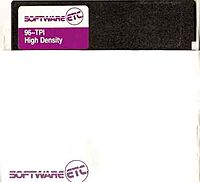
Babbage's (1984–1994)
GameStop traces its roots to Babbage's, a Dallas, Texas-based software retailer founded in 1984 by former Harvard Business School classmates James McCurry and Gary M. Kusin. The company was named after Charles Babbage and opened its first store in Dallas's NorthPark Center with the help of Ross Perot, an early investor in the company. The company quickly began to focus on video game sales for the then-dominant Atari 2600. Babbage's began selling Nintendo games in 1987. Babbage's became a public company via an initial public offering in 1988. By 1991, video games accounted for two-thirds of Babbage's sales.
NeoStar Retail Group (1994–1996)
Babbage's merged with Software Etc., an Edina, Minnesota-based retailer that specialized in personal computing software, to create NeoStar Retail Group in 1994. The merger was structured as a stock swap, where shareholders of Babbage's and Software Etc. received shares of NeoStar, a newly formed holding company. Babbage's and Software Etc. continued to operate as independent subsidiaries of NeoStar and retained their respective senior management teams. Babbage's founder and chairman James McCurry became chairman of NeoStar, while Babbage's president Gary Kusin and Software Etc. President Daniel DeMatteo retained their respective titles. Software Etc. chairman Leonard Riggio became chairman of NeoStar's executive committee.
Gary Kusin resigned as president of Babbage's in February 1995 to start a cosmetics company. Daniel DeMatteo, formerly president of Software Etc., assumed Kusin's duties and was promoted to president and chief operating officer of NeoStar. NeoStar chairman James McCurry was also appointed to the newly created position of NeoStar CEO. The company relocated from its headquarters in Dallas to Grapevine later that year.
NeoStar merged its Babbage's and Software Etc. units into a single organization in May 1996 amid declining sales. Company president Daniel DeMatteo also resigned, and NeoStar chairman and CEO James McCurry assumed the title of president. In September of that year, after NeoStar was unable to secure the credit necessary to purchase inventory necessary for the holiday season, the company filed for Chapter 11 bankruptcy and appointed Thomas G. Plaskett chairman while James McCurry remained company chief executive and president.
The leadership changes were not enough; in November 1996, the assets of NeoStar were purchased for $58.5 million by Leonard Riggio, a founder of Software Etc. and chairman and principal stockholder of Barnes & Noble. Electronics Boutique had also bid to purchase NeoStar, but the judge presiding over NeoStar's bankruptcy accepted Riggio's bid because it kept open 108 stores more than Electronics Boutique's bid would have. Approximately 200 retail stores were not included in the transaction and were subsequently closed.
Babbage's Etc. (1996–1999)
Following his purchase of NeoStar's assets, Leonard Riggio dissolved the holding company and created a new holding company named Babbage's Etc. He appointed Richard "Dick" Fontaine, previously Software Etc.'s chief executive during its expansion in the late 1980s and early 1990s, as Babbage Etc.'s chief executive. Daniel DeMatteo, previously the president of both Software Etc. and NeoStar, became company president and COO. Three years later, in 1999, Babbage's Etc. launched its GameStop brand with 30 stores in strip malls. The company also launched gamestop.com, a website that allowed consumers to purchase video games online. GameStop.com was promoted in Babbage's and Software Etc. stores.
Barnes & Noble Booksellers (1999–2004)
In October 1999, Barnes & Noble Booksellers purchased Babbage's Etc. for $215 million. Because Babbage's Etc. was principally owned by Leonard Riggio, who was also Barnes & Noble's chairman and principal shareholder, a special committee of independent directors of Barnes & Noble Booksellers evaluated and signed off on the deal. A few months later, in May 2000, Barnes & Noble acquired Funco, the owner of Eden Prairie, Minnesota-based video game retailer FuncoLand, for $160 million. Babbage's Etc., which had been previously operating as a direct subsidiary of Barnes & Noble, became a wholly owned subsidiary of Funco. With its acquisition of Funco, Barnes & Noble also acquired Game Informer, a video game magazine that was first published in 1991. Funco was renamed GameStop, Inc. in December 2000 in anticipation of holding an initial public offering for the company.
In February 2002, the company once again became a public company via an initial public offering. Barnes & Noble retained control over the newly public company with 67% of outstanding shares and 95% of voting shares. Barnes & Noble retained control over GameStop until October 2004, when it distributed its 59% stake in GameStop to stakeholders of Barnes & Noble, making it an independent company.
Expansion (2004–2016)
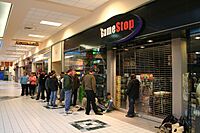
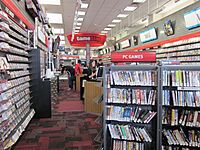
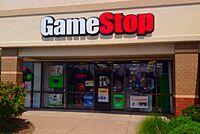
Acquisitions
- In 2005, GameStop acquired EB Games (formerly Electronics Boutique) for $1.44 billion. This expanded GameStop's operations into Australia, Canada, Europe and New Zealand. GameStop's operations expanded to over 4,250 stores worldwide as a result of the acquisition.
- In 2007, GameStop acquired Rhino Video Games, who operated 70 video game stores throughout the Southeastern United States, from Blockbuster for an undisclosed amount.
- In April 2008, GameStop acquired Free Record Shop's 49 Norwegian stores.
- In October 2008, GameStop acquired Micromania, a French video-game retailer, for $700 million. GameStop, which had previously owned no stores in France, now had 332 French video-game stores.
- In November 2009, it acquired a majority stake in Jolt Online Gaming, an Irish browser game studio. Jolt closed in 2012.
- In 2010, GameStop acquired Kongregate, a San Francisco-based website for browser-based games. In 2017, it was sold for $55 million.
- In 2011, GameStop acquired Spawn Labs and Impulse in separate transactions. Spawn Labs was a developer of technology that allowed users to play video games that were run remotely on machines in data centers rather than their personal computer or console. Impulse was a digital distribution and multiplayer video game platform acquired from Stardock, and renamed GameStop PC Downloads. Under the ownership of GameStop, the service was redesigned and sold games that use other platforms such as Steam while also selling games that use its own proprietary DRM solution, Impulse:Reactor. GameStop shut down both PC Downloads and Spawn Labs in 2014.
- In 2012, GameStop acquired BuyMyTronics, a Denver-based online market place for consumer electronics.
- In October 2012, GameStop acquired a 49.9% ownership interest in Simply Mac, a Salt Lake City-based Apple authorized reseller and repairer founded in 2006. GameStop acquired the remaining 50.1% of ownership in November 2013. GameStop tried to target areas for potential new Simply Mac locations in smaller markets that did not have an existing Apple Store within a reasonable driving distance. In January 2017, GameStop closed many Simply Mac locations. The chain had as many as 70 locations at the time of the announcement. In 2019, GameStop divested Simply Mac; at that time it had 43 stores.
- In November 2013, GameStop acquired Spring Mobile, a Salt Lake City-based retailer of AT&T-branded wireless services.
- It acquired 163 RadioShack locations in February 2015.
- In July 2015, GameStop acquired Geeknet.
- On August 3, 2016, GameStop acquired 507 AT&T store chains in plans to diversify into new businesses and less dependent on the video game market.
Brand expansion
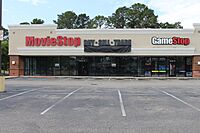
GameStop founded MovieStop in 2004 as a standalone store that focused on new and used movies. More than 42 locations were opened, which typically adjoined or were adjacent to GameStop locations. GameStop spun off MovieStop to private owners in 2012. In November 2014, Draw Another Circle LLC, a company controlled by merchandising executive Joel Weinshanker that also owns Hastings Entertainment, purchased MovieStop. The chain shuttered in 2016.
In October 2012 at Grapevine Mills in Dallas, GameStop introduced GameStop Kids, a pop-up retail concept. The brand, which had 80 locations in shopping malls during the Christmas and holiday season, focused on children's products, and carried only games rated "Everyone" by the ESRB, along with merchandise of popular franchises aimed towards the demographic.
In July 2014, GameStop's Australian Division EB Games Australia introduced ZiNG Pop Culture—a pop culture retailer. ZiNG Pop Culture has since expanded to over 50 standalone stores as well as numerous large format hybrid stores, which include both an EB Games and Zing Pop Culture store in a single location with an expanded selection of games merchandise.
Management changes
Daniel DeMatteo replaced Richard Fontaine as GameStop CEO in August 2008. DeMatteo had served as company COO since 1996. Fontaine, who had been GameStop chairman and CEO since 1996, remained the company's chairman. J. Paul Raines, formerly executive vice president of Home Depot, became company COO in September. J. Paul Raines became GameStop CEO in June 2010. He replaced Daniel DeMatteo who was named executive chairman of the company. Under his leadership, in 2012, GameStop's digital revenue grew from $190 million in 2011 to more than $600 million in 2012.
Decline (2016–2021)
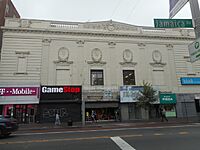
Changes in market conditions
The market for physical game media has been in a state of decline due to downloadable games on services such as Xbox Live, PlayStation Network, Nintendo eShop, and Steam. This has resulted in a decline in sales at GameStop. In 2017, GameStop reported a 16.4% drop in sales for the 2016 holiday season, but expressed optimism in its non-physical gaming businesses.
In February 2017, it was revealed that GameStop enforced, on all of its retail employees, a program known as Circle of Life. The policy itself was made to ensure that each employee would allow a certain percentage of their sales to pre-orders, rewards cards, used games, or have a customer trade in a game. Upon revelation of the policy, many current and former GameStop employees revealed stories of how the policy has led to them lying to customers. Many more claimed that the policy had led to poor working conditions and emotional distress. Later that month, GameStop reformed the program to solely focus on the store as a whole instead of the previous individual employee basis, though still maintaining a heavy emphasis on the individuals' performance to maintain strong store metrics.
Financial losses
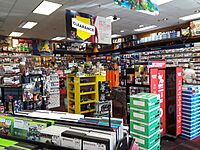
Shares of GameStop stock fell 16% in 2016. On February 28, 2017, shares dropped an additional 8% following Microsoft's announcement of its Xbox Game Pass service. Following these reports, GameStop announced it would close over 150 stores in 2017 and expand its non-gaming business. On the same day, however, GameStop said it planned to open 65 new Technology Brand stores and 35 Collectibles stores due to a 44% and 28% increase in sales, respectively. GameStop's total revenue fell 7.6% to $3.06 billion in the quarter ended February 2, 2018.
Business Insider described GameStop's investment in Spring Mobile as a failure, with estimates that the company spent $1.5 billion on acquisitions on Spring Mobile and store locations, but only gained $700 million from the sale of Spring Mobile to Prime Communications in 2018, leaving them $800 million in debt.
In late June 2018, GameStop confirmed talks of a possible sale, with Sycamore Partners, a private equity firm, the most likely buyer, with a target deal expected by February 2019. However, on January 29, 2019, GameStop reported it had stopped looking for a buyer for the company, due to a "lack of available financing on terms that would be commercially acceptable to a prospective acquirer", and was looking for other actions to help re-establish its financial ground. Shares dropped 27% to a 14-year low immediately following this announcement.
The financial results for 2018 showed the biggest loss in GameStop company history. For the 52-week period ending on February 2, 2019, GameStop reported a record-breaking net loss of $673 million. This was a change from the net profit of $34.7 million in the previous year. The net sales for fiscal year 2018 were down 3% year-on-year to $8.29 billion. The company also eliminated its dividend.
In December 2021, GameStop posted a larger-than-expected loss in the fiscal third quarter, and investors are waiting to hear how the ailing company plans to restructure its operations and entice gamers back. In extended trade, shares plummeted.
In March 2024, GameStop announced net income of $6.7 million for fiscal year 2023.
Management changes
After being on medical leave since November 2017 due to reoccurrence of a brain tumor, J. Paul Raines resigned from GameStop on January 31, 2018, and died on March 4, 2018. DeMatteo, GameStop's executive chairman stepped in as interim chief executive officer. On February 6, 2018, the company announced Michael K. Mauler as CEO and member of the board of directors. On May 11, 2018, Mauler resigned due to "personal reasons" and chairman Dan DeMatteo was named interim CEO. Mauler did not take any severance package or separation benefits. On May 31, 2018, GameStop named Shane Kim as interim CEO. Kim was replaced by George Sherman in March 2019. On March 12, 2020, it was announced that a group of shareholders including Hestia Capital Partners LP and Permit Capital Enterprise Fund LP sent a "threat" letter to the Grapevine, Texas, company's board, urging it to appoint a stockholder representative as a director.
Turnaround efforts
American Division Efforts
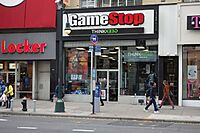
All GameStop stores in Puerto Rico were shut at the end of March 2016, citing increased rates of government taxes.
In July 2019, GameStop partnered with an outside design firm, R/GA, to put forth plans to revamp stores to focus on competitive gaming and retrogaming, and to introduce new ways for customers to try games before buying them. Each concept store is expected to be mutually exclusive.
A leaked email revealed on July 31, 2019, indicated that 50 employees, including district and regional managers, would be laid off as a result of reorganization efforts. In August 2019, GameStop laid off over 120 people, including about half of the staff of Game Informer, as part of its "GameStop Reboot initiative".
In August 2019, Michael Burry's investment firm Scion Asset Management sent a letter to GameStop executives urging the company to engage in a $238 million stock buyback. The letter also revealed that Scion owned approximately 2,750,000 shares, or about 3.05% of GameStop. The stock price of GameStop, which had been in steady decline in share price since late January 2019, spiked roughly 20% after Burry revealed that he was buying the stock in an interview with Barron's. In the interview, Burry explained that both Sony and Microsoft would enter the next console generation with a physical disc drive and therefore likely extend the longevity of GameStop. He also noted that the company's balance sheet was in good condition. In December 2019, GameStop announced that it spent $178.6 million to buy 34.6 million shares, or 34% of the shares outstanding, at an average price of $5.14 per share. In May 2020, Burry lowered his stake in GameStop.
After reporting that it had missed analysts' expectations during the 2nd quarter of the fiscal year 2019 ending August 2019, as reported in September 2019, GameStop announced that it was planning to close about 180–200 underperforming stores of the 5,700 it had worldwide in the short term, along with developing metrics to evaluate other potential closures over the next two years. In March 2020, four members of GameStop's board of directors – Dan DeMatteo, Gerald Szczepanski, Larry Zilavy, and Steve Koonin – stepped down and were replaced by Reggie Fils-Aimé, Bill Simon and J.K. Symancyk as part of the company's effort to turn around the business.
On October 8, 2020, GameStop announced an agreement with Microsoft to migrate backend systems to Microsoft 365 platforms including Dynamics 365, also including in-store usage of Microsoft Surface products by employees. It was later reported that this agreement would also include revenue sharing on all digital game purchases for Xbox Series X and S for each product sold by the retailer, although the exact percentage of this share was not disclosed.
Australian Division Efforts
GameStop's Australian division has been focused on increasing higher-margin merchandise and opening more large format hybrid stores which include both an EB Games and Zing Pop Culture store in a single location. These locations have an expanded selection of merchandise based on both games and pop culture. The Sydney Morning Herald reported the diversification into merchandise through the establishment of the Zing Pop Culture brand in 2014 had been vital in keeping the company profitable. The newspaper reported the greater focus on merchandise allowed the company to tap into the lucrative, higher-margin merchandise market of t-shirts, figurines and bobbleheads. The newspaper noted former staff agreed that the Australian divisions' merchandise pivot has been key to the divisions survival in Australia's tough retail landscape. However, they also pointed to the pre-owned games segment as a major part of its success. GameStop's Australian division has been the only profitable segment of the global GameStop business for the 2020, 2021 and 2022 fiscal years. The company reported profits of US$9.4 million, US$52.2 million and US$30.6 million for each fiscal year respectively.
COVID-19 pandemic
See also
 In Spanish: GameStop para niños
In Spanish: GameStop para niños


